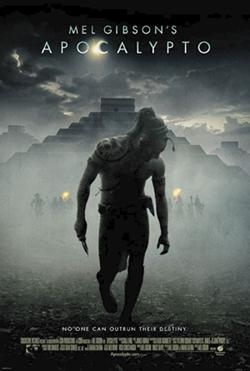 Yesterday, I had the privilege of seeing a pre-screening of Mel Gibson’s new film, Apocalypto. The movie has left me in complete shock and awe.
Yesterday, I had the privilege of seeing a pre-screening of Mel Gibson’s new film, Apocalypto. The movie has left me in complete shock and awe.
So, what’s this flick about? The previews are quite misleading. The producers make the movie seem like a story about the fall of the Mayan Empire before the Spanish arrival. The film is actually about a young man whose village is overtaken by other natives. The main character, Jaguar Paw, escapes imprisonment and seeks his pregnant wife and child who have been separated from him during the assault. During his return to the ravaged village, his would-be captors hunt him like a wild animal.
No political struggles in the plot; only ultra-violence and a tiny glimpse of Mayan culture. What could possibly interest a libertarian in Apocalypto?
First of all, Political Incorrectness. This depiction of American natives is one of the most brutal portrayals ever put on the screen. There is no peace pipe—smoking non-land—owning Indian bull. The Mayans are shown as bloodthirsty, unredeemed savages.
Apocalytpo starts out as a peaceful village in the jungle is destroyed by Mayans from a greater metropolitan city. A third of the villagers are mercilessly bludgeoned to death, a third raped, and another third are captured for enslavement plus human sacrifice. I could not imagine such a war-like representation of Indians coming out of Hollywood in my wildest dreams.
The film gives no pleasures to the relativist. The pagan Mayas are so infuriating that the viewer feels not the slightest drop of pity for their culture. Near the end, one would not feel ashamed to say in a crowded theatre, "Thank God they’ve been Christianized." The intensity and uncompromising nature of the movie left me in complete disbelief.
The most spectacular scene in the story occurs as the prisoners arrive at the steps of the sacrificial temple. Heads plop and bounce off the infinite steps rising to the top as jubilant crowds celebrate the sacrifices made to the gods by priests. The rulers observe with irreverence.
The crowds dance to tribal beats in high energy, almost like a Toby Keith concert during his all too popular "American Soldier," elevating unnecessary death. The murders for the pagan gods seem to continue with eternal hellishness, to pose false solutions to fictitious threats.
When the captives central to the story arrive at the top to meet their end, the maniacal priest gives a speech to the masses below. He shouts about a horrendous plague that has devastated the countryside. He warns of enemies. Therefore, these human sacrifices must be made to satisfy the bloodlust of the gods. The crowd roars with happiness. It is a scene of utilitarianism at its most flawed, the pain of one being outweighed by the comfort gained by the many.
Then a miraculous event occurs: the moon moves its silhouette over the sun, the day turns to night, and the mob is terrified. The priest shrieks that this is not a curse. If the people have not made enough sacrifices, the moon will stay. The masses become even more afraid. Seconds after the demonic priest’s words, the moon moves away from the sun.
The crowd bursts with excitement, proclaiming the favor of the gods and the necessity of the bloody river pouring down the temple. All is well for the "public good."
The priest looks back at the rulers, undisturbed by the event, and chuckles at the foolishness of the ignorant populace.
Is this situation much different from what we see today? We place our dollars upon the sacrificial altars of big government. Solutions are not necessary; only reassurance. The masses just need to know that "we’re doing something about the problem."
The gory priests still exist. However, today they are leftist university professors and neocon media squawkers. These individuals speak to crowds convincing them to believe in mindless utopia or demonic power as in the days of old.
The ruler elite and the state corporatists still know the game, and achieve their ends at the expense of the sacrificed. The temple may be gone and the public sacrifices hidden, but the story is the same. Whether it is literally the sacrificed lives of American and Iraqi men and women, or the taxpayers’ dollars, the blood continues to pour down the steps.
The nature of government has always been the same. Throughout history, it only manifests itself in more or less powerful forms, and more or less marketable forms. It was Apocalytpo then, and it is no less Apocalytpo now.



